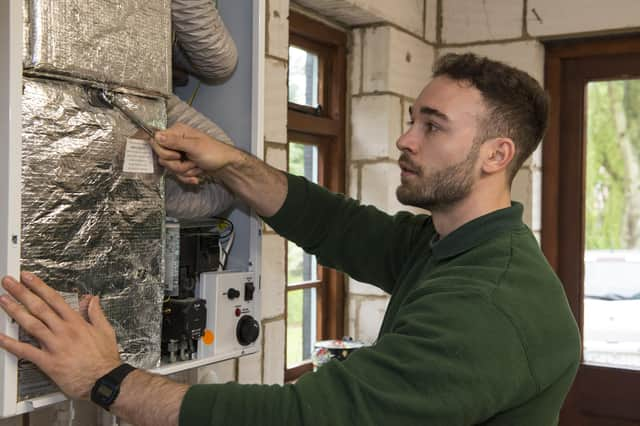Sharp decline in boiler servicing over past 12 month


That’s according to OFTEC, the trade association for the heating and cooking industries in the UK and Ireland, who say there has been a 20% reduction in the number of boilers serviced in the last year.
However, OFTEC Ireland manager, David Blevings, has warned homeowners not servicing their boiler annually, as recommended by the Consumer Council for Northern Ireland, could create a “false economy”.
Advertisement
Hide AdAdvertisement
Hide Ad“While not servicing your equipment regularly in line with the manufacturer’s guidelines can affect your warranty, regularly servicing your boiler will help keep your appliance running safely and smoothly, reduce fuel bills and the likelihood of unexpected breakdowns,” he said.
“This is not just an industry claim, this message is also endorsed by The Health & Safety Executive for NI (HSENI).
“Always use a competent person, such as an OFTEC registered engineer, to install and service oil burning equipment. This will offer extra piece of mind knowing that any work that is carried out will be done by a competent professional who has been trained and inspected.
“Servicing should include important system checks, such as expansion vessels, system pressure, condensate traps and auto air vents. It should also include analysis of flue gases with an appropriate analyser and check for any defects to the appliance and the flue.”
Advertisement
Hide AdAdvertisement
Hide AdHe continued: “It’s strongly recommended that appliances and equipment are serviced annually.
“It is concerning that technicians are reporting a 20% decrease in the number of services taking place this year – that would suggest a lot of householders are trying to save money as cost-of-living pressures continue.
“But regular servicing reduces the risk of unexpected breakdowns, and no-one wants to be hit with an unexpected bill, or left without heating and hot water, for days on end. Additionally, an efficiently running boiler will help save you money on fuel.
“However, a badly maintained or poorly installed appliance could put you, and your family, at risk of carbon monoxide poisoning.”
Advertisement
Hide AdAdvertisement
Hide AdWithout regular servicing, the efficiency and reliability of a boiler could be impacted in a number of ways including:
Excessive smoke and partially burnt fuel deposits can cause soot to form within the appliance heat exchanger. This restricts the amount of heat that can be transferred into the heating system. The cleaner the heat exchanger, the more efficient the appliance will be.
Fuel nozzles regulate how much fuel passes through the burner. Nozzles are consumable items that wear over time, affecting combustion and lowering boiler efficiency. If they are not replaced this may cause ‘sooting up’ of the heat exchanger due to too much fuel passing through the burner.
Consumable parts, like seals and fuel hoses, can deteriorate over time and lead to fuel leaks or even carbon monoxide incidents.
Advertisement
Hide AdAdvertisement
Hide AdFuel pumps contaminated with debris and/or water can cause premature failure.
Photocells can glaze over with deposits. Photocells are an important safety feature which detect whether the boiler has lit. If a photocell is dirty, it may not be able to detect the burner flame correctly and this could lead to random shutdowns. Appliances frequently switching on and off are less efficient than those running for longer periods of time.
Electrodes can wear and attract soot and deposits. Electrodes produce a spark to light the fuel, if they are worn and in poor condition, the appliance may not light. Again, this causes inconvenience, inefficiency, and increased fuel cost.
Mr Blevings has also urged householders to ensure their oil tanks are maintained.
Advertisement
Hide AdAdvertisement
Hide AdHe said: “The condition of the tank, fuel supply network and all ancillary fuel supply components such as filters, deaerators etc should always be visually inspected and observations reported during service visits.
“At this stage, action can be taken to replace or repair equipment as necessary and, if the tank is over 20 years old, consumers should consider upgrading to a bunded oil tank.”
For more information visit https://www.oftec.org/